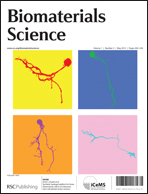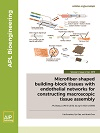
JOURNAL OF BIOMEDICAL MATERIALS RESEARCH PART B-APPLIED BIOMATERIALS
Scope & Guideline
Driving Innovation in Biomaterials for Enhanced Patient Care
Introduction
Aims and Scopes
- Biomaterial Development and Characterization:
The journal emphasizes the synthesis, processing, and characterization of novel biomaterials, including polymers, ceramics, and composites, aimed at improving clinical outcomes. - Tissue Engineering and Regenerative Medicine:
Research articles often address the use of biomaterials in tissue engineering applications, focusing on scaffolds that promote cell attachment, proliferation, and differentiation for tissue regeneration. - Drug Delivery Systems:
A significant focus is on the development of biomaterials that serve as drug delivery systems, including controlled release mechanisms and targeted delivery approaches for therapeutic agents. - In Vivo and In Vitro Evaluations:
The journal publishes studies that involve both in vitro and in vivo assessments of biomaterials to evaluate their performance, safety, and efficacy in medical applications. - Interdisciplinary Approaches:
Research often integrates materials science, biology, and engineering, highlighting the collaborative nature of advancements in biomedical materials.
Trending and Emerging
- Smart Biomaterials:
There is an increasing focus on the development of smart biomaterials that respond to environmental stimuli, such as pH, temperature, or light, to enhance their functionality in medical applications. - 3D Bioprinting:
Research involving 3D bioprinting techniques for creating complex tissue structures is trending, reflecting the demand for customizable and patient-specific solutions in regenerative medicine. - Antibacterial and Antimicrobial Materials:
A significant increase in studies focused on the development of biomaterials with inherent antibacterial properties is evident, addressing the pressing issue of infection in implants and medical devices. - Nanotechnology in Biomaterials:
The incorporation of nanotechnology into biomaterials research is on the rise, with studies exploring the effects of nanoscale modifications on the properties and performance of biomaterials. - Biomimetic Approaches:
There is a growing interest in biomimetic designs that replicate the natural extracellular matrix, enhancing the integration and functionality of synthetic biomaterials in the body.
Declining or Waning
- Traditional Biomaterials:
There is a noticeable decline in research focused exclusively on traditional biomaterials without modification, as newer, more advanced materials and composites are prioritized. - Basic Biocompatibility Studies:
Research that solely assesses the basic biocompatibility of materials without exploring their functional applications or enhancements is becoming less frequent. - Conventional Drug Delivery Methods:
The exploration of conventional drug delivery systems is waning, with a shift towards more innovative and complex delivery mechanisms that enhance therapeutic efficacy. - Animal Models for Testing:
The reliance on traditional animal models for testing biomaterial efficacy is decreasing, as there is a growing trend towards developing alternative in vitro models that better mimic human physiology. - Single-Function Materials:
Research focusing on biomaterials designed for a single function (e.g., only for structural support) is declining, as multifunctional materials that address multiple clinical needs gain prominence.
Similar Journals

Biomaterials Science
Innovating healthcare solutions with cutting-edge biomaterials research.Biomaterials Science is a premier journal published by the Royal Society of Chemistry that serves as a leading platform for researchers and professionals in the fields of Biomedical Engineering and Materials Science. With an impressive impact factor bolstered by its Q1 quartile ranking in both disciplines, this journal has positioned itself at the forefront of cutting-edge research, showcasing innovative materials and applications that drive advancements in healthcare and technology. Since its inception in 2013, Biomaterials Science has been committed to disseminating high-quality, peer-reviewed articles that promote scientific knowledge and collaboration among academia and industry. With a global readership and a focus on open access, researchers are encouraged to share their findings to facilitate the development of transformative biomaterials and their applications. Join a vibrant community of scholars as we explore the future of biomaterials through this esteemed publication, enhancing both scientific inquiry and practical application.

JOURNAL OF BIOMATERIALS SCIENCE-POLYMER EDITION
Transforming biomedical applications with cutting-edge biomaterials.JOURNAL OF BIOMATERIALS SCIENCE-POLYMER EDITION, published by Taylor & Francis Ltd, is a distinguished scholarly journal dedicated to the exploration of biomaterials and their applications in various fields such as bioengineering, biomedical engineering, and biophysics. With an ISSN of 0920-5063 and an E-ISSN of 1568-5624, this journal offers a platform for researchers and professionals to share innovative findings and methodologies that advance the science of polymer-based biomaterials. The journal's impact within the academic community is underscored by its notable Scopus rankings, including a Q2 status in both Biomedical Engineering and Biophysics as of 2023, reflecting its significant contribution to advancing knowledge and practice in these fields. The scope of the journal spans from fundamental research to applications in medical devices and regenerative medicine, ensuring comprehensive coverage of the latest trends and breakthroughs. Although it does not currently offer open access options, the journal remains a pivotal resource for students, researchers, and professionals committed to the development and application of biomaterials in healthcare. For further details, the journal is based in Abingdon, United Kingdom, at 2-4 Park Square, Milton Park, OX14 4RN.

International Journal of Biomaterials
Unlocking the potential of biomaterials for enhanced medical technologies.The International Journal of Biomaterials, published by HINDAWI LTD, is a premier platform for disseminating groundbreaking research in the fields of biomaterials and biomedical engineering. With an Open Access approach since 2009, this journal provides unhindered access to innovative studies and applications aimed at advancing medical technologies and improving patient outcomes. Notably ranked in the Q3 category for both Biomaterials and Biomedical Engineering in 2023, it serves as an essential resource for researchers, practitioners, and students alike. The journal's Scopus rankings, including a 49th percentile in Biomedical Engineering and a 40th percentile in Biomaterials, further underscore its growing prominence in the academic community. With contributions spanning from 2011 to 2024, the journal seeks to foster collaborative research and promote developments that enhance the understanding and application of biomaterials in healthcare.

JOURNAL OF BIOMEDICAL MATERIALS RESEARCH PART A
Pioneering research in biocompatible materials for medical innovation.JOURNAL OF BIOMEDICAL MATERIALS RESEARCH PART A, published by WILEY, is a leading journal in the field of biomaterials and biomedical engineering, showcasing cutting-edge research that bridges the gap between material science and healthcare applications. With a robust 2023 impact factor reflecting its high-quality contributions, this journal is classified in the Q2 quartile for Biomaterials, Biomedical Engineering, and Ceramics and Composites, while achieving an impressive Q1 ranking in Metals and Alloys. The journal caters to a diverse readership, including researchers, professionals, and students, aiming to facilitate innovation and advancements in biocompatible materials and their applications in medical devices and tissue engineering. Access options for readers are available, ensuring the latest studies and findings are readily accessible to all stakeholders in this dynamic field. As it progresses towards its 2024 target, the JOURNAL OF BIOMEDICAL MATERIALS RESEARCH PART A continues to be an essential resource for anyone involved in the development and application of biomedical materials.

Bioactive Materials
Catalyzing Discoveries in Bioactive Materials and ApplicationsBioactive Materials, published by KEAI PUBLISHING LTD, stands as a leading Open Access journal in the fields of Biomaterials, Biomedical Engineering, and Biotechnology. Since its inception in 2016, this journal has rapidly ascended in prominence, currently holding a prestigious Q1 category ranking across multiple disciplines, reflecting its significant impact within the scientific community. With its E-ISSN 2452-199X, it spans a broad spectrum of research areas, contributing valuable insights to the ongoing discourse in bioactive materials and their applications. The journal's superior Scopus rankings further illustrate its influence, boasting impressive standings in engaging niches such as engineering and molecular biology. Bioactive Materials offers a vital platform for researchers, professionals, and students to disseminate and acquire cutting-edge knowledge, thus fostering innovation and collaboration in the rapidly evolving terrain of biomedicine. Its commitment to Open Access since 2016 enhances accessibility, ensuring that the burgeoning advancements in this field reach a global audience.

COLLOIDS AND SURFACES B-BIOINTERFACES
Innovating Interactions for Tomorrow's BiotechnologyCOLLOIDS AND SURFACES B-BIOINTERFACES is a premier interdisciplinary journal published by Elsevier, dedicated to advancing the knowledge of interfaces and interactions in biological systems and their applications in biotechnology. With an impressive impact factor that underscores its significance in the field, the journal ranks in the Q1 category for Biotechnology, Medicine, and Physical and Theoretical Chemistry in the 2023 classifications. It has achieved notable positions in Scopus rankings, highlighted by a top-tier rank in Colloid and Surface Chemistry, demonstrating its influence on ongoing research. Spanning from 1993 to 2025, C&B B-BIOINTERFACES serves as a vital platform for innovative research contributions, fostering knowledge exchange among researchers, professionals, and students. The journal focuses on the intricate relationships between colloids, surfaces, and biological materials, paving the way for groundbreaking developments in drug delivery, biomaterials, and nanotechnology. While not an open-access publication, readers can anticipate insightful, high-quality articles that significantly impact the scientific community.

APL Bioengineering
Unleashing the Potential of Bioengineering InterdisciplinarityAPL Bioengineering is a premier open-access journal published by AIP Publishing, dedicated to advancing the field of bioengineering and its interdisciplinary applications. Established in 2017, this journal serves as a vital platform for researchers, professionals, and students interested in the critical intersections of bioengineering, biomaterials, biomedical engineering, and biophysics. With an impressive impact factor and consistent rankings in the Q1 category across multiple domains, including biochemistry and materials science, APL Bioengineering has positioned itself among the top journals in its field. The journal aims to publish innovative original research, comprehensive reviews, and insightful case studies that further the understanding and application of bioengineering principles. Since its inception, APL Bioengineering has fostered a community of thought leaders, providing open access to ensure broad dissemination of knowledge and advancements that underpin the future of biomedical innovation.

Biomedical Materials
Innovative Insights for Enhanced Patient Care.Biomedical Materials, published by IOP Publishing Ltd, is a premier journal dedicated to the rapidly evolving field of biomedical engineering and materials science. With a robust impact factor showcasing its influence, this journal serves as a vital platform for disseminating pioneering research from 2006 to 2024. Covering an array of interdisciplinary topics—ranging from biomaterials to bioengineering and applied chemistry—the journal consistently ranks in the second quartile across multiple categories including Bioengineering (Q2), Biomaterials (Q2), and Biomedical Engineering (Q2) as of 2023. Researchers, professionals, and students alike benefit from its contributions, exploring innovative solutions at the intersection of biology and material science. Although not an Open Access journal, Biomedical Materials remains essential in advancing our understanding and facilitating discussions surrounding state-of-the-art materials that revolutionize medical applications and enhance patient care.

Nature Biomedical Engineering
Leading the Charge in Biomedical InnovationNature Biomedical Engineering is a premier journal published by NATURE PORTFOLIO, focusing on innovative research at the intersection of engineering and biomedical sciences. With an ISSN of 2157-846X, this journal aims to disseminate groundbreaking studies that advance the field of bioengineering, biotechnology, and medical applications. Since its inception in 2017, it has rapidly earned a reputation for excellence, consistently achieving a Q1 ranking in various categories including Bioengineering and Biomedical Engineering, and receiving acclaim in prestigious Scopus rankings, boasting top positions in the fields of Computer Science Applications and Medicine. The journal operates under a rigorous peer-review process, ensuring that all published articles contribute substantially to the existing body of knowledge. Furthermore, it facilitates a broad accessibility model for researchers and practitioners, bolstering collaboration and innovation within the global scientific community. Nature Biomedical Engineering is not just a publication; it serves as a vital platform for thought leadership in the transformative field of biomedical engineering.

Materials
Unlocking the potential of innovative materials for a brighter future.Materials is an esteemed journal published by MDPI, dedicated to advancing the fields of Condensed Matter Physics and Materials Science. With its commitment to Open Access since its inception in 2008, the journal has made significant strides in disseminating high-quality research globally, allowing researchers, professionals, and students easy access to cutting-edge studies without financial barriers. Hailing from Switzerland, the journal has shown remarkable growth and prominence, currently ranked in the Q2 quartile in its categories according to the latest assessments, which highlights its impact within the community. As the journal converges its focus from 2008 to 2024, it aims to continually foster a robust exchange of knowledge on innovative materials and their applications, thereby supporting the evolving landscape of science and technology. With an E-ISSN of 1996-1944 and a user-friendly platform, Materials is poised to be a leading choice for scholars eager to contribute to and engage with pioneering research.